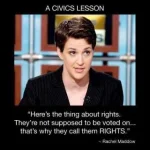Here is the actual poll itself:
"Pro-Choice" Americans at Record-Low 41%.
At the bottom of this link you can click the "View methodology, full question results, and trend data" link to download that to your PC in .pdf.
The question asked was: "With respect to the abortion issue, would you consider yourself to be pro-choice or pro-life?"
There was no presentation of what pro-choice is or pro-life is, just a question to pick "either"/"or".
Abortion is such a politicized issue that most people have heard these two ideological terms, but few really know what they are.
People have come to associate these two terms with the left and the right on the standard political spectrum.
Many people will choose one or the other based on what or who they identify without really knowing what each term means. And many will choose one or the other simply because that's how the question was phrased and they want to be a part of the graphed outcome, with only 10% declining to say one way or the other.
The poll also doesn't state how many people were called who refused to participate in a poll where the question was phrased as a dualistic polemic.
Thus these kind of poorly presented polls regarding labels are simply meaningless. If people knew what each term truly meant, the great majority would simply say neither. Especially true if they were given a number of additional truly existent choices.
By looking at the question results for "Do you think abortions should be legal under any circumstances, legal only under certain circumstances, or illegal in all circumstances?" we can get a somewhat better picture of the pro-choice/pro-life breakdown.
25% said "legal under any circumstances" -- these are your pro-choicers.
20% said "illegal in all circumstaces" -- these are your pro-lifers.
52% said "legal under certain circumstances" -- the vast majority of these are your neithers, centrists on the abortion spectrum, with a small minority moderately pro-choice or moderately pro-life.
But if the questions were phrased correctly with respect to accuracy, we'd clearly see a great majority of people in the centrist "neither" category.
The value in the poll graph presented in the OP is the implied increase in the percentage of people who realize and accept the scientific reality that a human begins to live at conception and who find killing a human at any stage to be generally unethical and situationally morally wrong.

